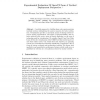Free Online Productivity Tools
i2Speak
i2Symbol
i2OCR
iTex2Img
iWeb2Print
iWeb2Shot
i2Type
iPdf2Split
iPdf2Merge
i2Bopomofo
i2Arabic
i2Style
i2Image
i2PDF
iLatex2Rtf
Sci2ools
108
click to vote
TRIDENTCOM
2010
IEEE
2010
IEEE
Experimental Evaluation of OpenVZ from a Testbed Deployment Perspective
A scalable approach to building large scale experimentation testbeds involves multiplexing the system resources for better utilization. Virtualization provides a convenient means of sharing testbed resources among experimenters. The degree of programmability and isolation achieved with such a setup is largely dependent on the type of technology used for virtualization. We consider OpenVZ and User Mode Linux (UML) for virtualization of the ORBIT wireless testbed and evaluate their relative merit. Our results show that OpenVZ, an operating system level virtualization mechanism significantly outperforms UML in terms of system overheads and performance isolation. We discuss both qualitative and quantitative performance features which could serve as guidelines for selection of a virtualization scheme for similar testbeds.
Computer Networks | Level Virtualization Mechanism | TRIDENTCOM 2010 | User Mode Linux | Virtualization Scheme |
Related Content
| Added | 15 Feb 2011 |
| Updated | 15 Feb 2011 |
| Type | Journal |
| Year | 2010 |
| Where | TRIDENTCOM |
| Authors | Gautam D. Bhanage, Ivan Seskar, Yanyong Zhang, Dipankar Raychaudhuri, Shweta Jain |
Comments (0)

